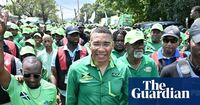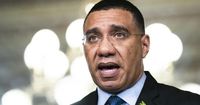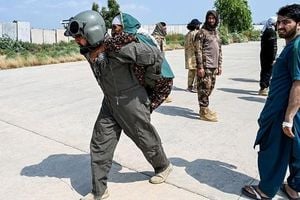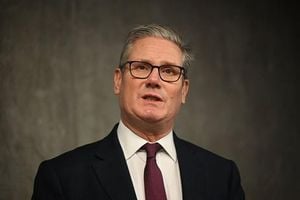On September 3, 2025, Jamaicans turned out to vote in a pivotal general election that many believe could set the course for the island nation’s future. With 63 seats in the House of Representatives up for grabs, the contest was a high-stakes showdown between Prime Minister Andrew Holness of the Jamaica Labour Party (JLP) and Mark Golding, the longtime leader of the People’s National Party (PNP). The Jamaica Progressive Party, the United Independents’ Congress, and nine independent candidates also joined the fray, but the real battle, as most observers noted, was between the two major parties.
Just over two million registered voters—out of a population of 2.8 million—were eligible to cast their ballots, and turnout was a key question on everyone’s lips. Historically, Jamaica’s vibrant democracy has suffered from declining voter participation, with only about 37% showing up at the polls in 2020. However, this year’s preliminary figures suggested a higher level of engagement, with the electoral office reporting a 57% turnout among security forces and election workers who voted early, according to the Associated Press.
The stakes were unmistakably high. As Bloomberg reported, Prime Minister Holness was seeking a rare third term, touting a record of falling national debt, a dramatic reduction in crime, and record-low unemployment. The JLP’s campaign leaned heavily on these achievements, arguing that continuity was essential to maintaining Jamaica’s hard-won stability. Holness himself pointed to a 43% drop in killings so far in 2025, which he attributed to increased firearm seizures and a stronger, more coordinated security presence across the Caribbean island. "I would say choose Jamaica," Holness urged, after casting his vote, referencing both the progress made and the need for voters to participate despite reports of slow lines at some polling stations.
But the opposition PNP, led by attorney Mark Golding, offered a sharp critique of the status quo. Golding and his party zeroed in on persistent socioeconomic challenges—poverty, inadequate infrastructure, and stubborn pockets of crime and corruption. According to Miami Herald, Golding renounced his UK citizenship to avoid controversy and campaigned on a platform promising reforms, renewed social investment, and a break from what he called “complacency” in governance. The PNP’s flagship proposal was to raise the income tax threshold from $11,200 to $21,800, aiming, as Golding put it, to “deliver a better life for our people” by putting more money in the hands of working-class Jamaicans.
While the JLP trumpeted macroeconomic stability—citing a record-low unemployment rate of 3.7% in January 2025 and inflation within the Bank of Jamaica’s target band—the PNP framed the election as a chance to reset priorities. They promised a bigger push on water, health, and education services, and a friendlier tone toward labor. Golding’s message was clear: “There are a lot of frustrated people tired of the conditions in which they live.”
Holness, meanwhile, made headlines with a bold pledge just days before the election: if reelected, he would double the minimum wage from $100 per 40-hour workweek. “We believe in growing the economy so that everyone gets a bigger slice,” he said at a rally, according to AP. “As the economy expands, we must ensure those at the bottom are rewarded fairly, while creating incentives for more Jamaicans, especially our youth, to join the labor force.” The proposal was not without controversy. The Jamaica Hotel and Tourist Association, representing a sector that accounts for about one-third of Jamaica’s GDP, warned that such a wage hike could have “wide-ranging implications for the sector, including employment levels, competitiveness and the affordability of the Jamaican tourism product.”
Crime and security dominated much of the debate. The JLP’s tough anti-crime posture, including the use of states of emergency in certain areas, has won praise for its effectiveness, with some regions like St. James seeing killings drop by as much as 70%. Yet, human rights organizations have voiced concerns about potential abuses and illegal detentions, calling for a careful balance between security and civil liberties. As Lansing Institute noted, sustaining the sharp drop in murders without over-reliance on emergency powers remains a key governance test for whoever wins.
Integrity and trust in public life also loomed large. Holness faced allegations from the Integrity Commission regarding his asset declarations, which he pushed back against, while Golding’s renunciation of UK citizenship was intended to neutralize another potential controversy. Both parties, in their own way, were keenly aware of the risk that unresolved scandals could erode public trust and undermine the legitimacy of Jamaica’s institutions.
Internationally, the election drew attention from a host of foreign actors. The Organization of American States (OAS) deployed observers to monitor the vote, reflecting concerns about transparency and public order, especially in what was expected to be a close race. The United States, Jamaica’s top trade partner and security ally, watched closely, as did the IMF and World Bank, both eager to see continued reform and fiscal discipline. China, with its legacy interests in Jamaican infrastructure, and the UK, with an eye on ongoing constitutional reform and potential moves toward a republic, also had a stake in the outcome.
Polls leading up to election day painted a picture of a nation divided. The RJRGLEANER/Don Anderson series suggested a narrow PNP lead, while the Nationwide/Bluedot tracking poll put Holness and the JLP ahead in both favorability and voting intent. Analysts agreed that the results would likely hinge on a dozen or so swing constituencies—urban Kingston, St. Andrew, and St. Catherine among them. With 32 seats needed for a plurality and 33 for a majority, every vote counted, and the potential for a photo-finish or even legal challenges loomed large.
Beyond the numbers and the party platforms, the election exposed deeper social currents. The influential Jamaican diaspora, especially in the US and UK, could shape narratives and remittance flows. Younger voters, more vocal on issues like climate, jobs, and rights, risked feeling unrepresented if their concerns were not addressed, potentially deepening generational divides.
As the ballots were cast and the nation waited for the results, Jamaicans faced a choice between continuity and correction—between staying the course with the JLP’s emphasis on macroeconomic stability and security, or embracing the PNP’s promise of renewed investment in social services and greater equity. The risks ahead were clear: disputed results could threaten legitimacy, fiscal slippage might unnerve investors, and abrupt shifts in anti-crime strategies could spark volatility. Managing these challenges would require deft leadership and a willingness to bridge divides, both old and new.
For now, Jamaica stands at a crossroads, with its future in the hands of its people and its leaders—eager to see whether the next chapter will bring more of the same, or something altogether different.






